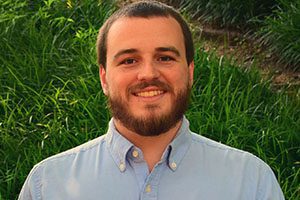2019/2020 Thomas D. Walsh Graduate Research Fellowship Winner Announced

|
The Thomas D. Walsh Graduate Research Fellowship, made possible by the generous support of Dr. Thomas D. Walsh recognizes outstanding contributions by M.S. candidates to graduate research. Returning graduate students are eligible for this prestigious award after their first year. The Thomas D. Walsh Graduate Research Fellowship supports the winner with a research assistantship and tuition support through their second year. We are congratulating the 2019/2020 Thomas D. Walsh Graduate Research Fellow Logan Hamm! We will briefly recognize Logan during the new graduate student reception on Friday, August 16 at 12:30 PM, and honor the awardee during the Walsh Graduate Student Reception 2019 (tentative: Friday, October 25). |
Logan Hamm joined UNC-Charlotte after leaving his hometown of Hanover, Pennsylvania and obtaining his B.S. in Chemistry with a focus on forensic science at Appalachian State University in Boone, North Carolina in 2018. As an undergraduate student, Logan did research with Dr. Brett Taubman to analyze how the method of dry hopping versus steam distilled essential hop oils affect the final aroma, flavor, and essential oil composition of beer. Sensory and chemical analysis of beer was conducted using sensory panels and solid-phase microextraction for gas chromatography with flame ionization detection of volatile compounds. Logan decided to pursue a Master’s degree in chemistry at UNC Charlotte to gain more hand-on research experience to better prepare himself for a career in industry. Logan hopes to work as a R&D scientist at a company that focuses on developing biosensors for global health issues or the food industry.
Logan currently works under the guidance of Dr. Swarnapali De Silva Indrasekara to develop a diagnostic biosensor for early malaria detection. Controlling the transmission of malaria is one of the major efforts toward eradicating the disease, which needs early diagnosis of the infection before the onset of symptoms, i.e. at the asymptomatic stage. However, asymptomatic detection is challenging due to the low amount of parasitic nucleic acid biomarkers present, which demands analytical techniques that offer higher sensitivity than currently available. Logan’s thesis is focused on using surface-enhanced Raman spectroscopy (SERS) to detect nucleic acid biomarkers of malaria directly in infected blood. In specific, he is developing a SERS based biosensing assay to detect mRNA biomarkers of malaria (Pfs25-mRNA) in infected blood with no RNA extraction or amplification. The working principle of the proposed assay is to identify the target mRNA using its hybridization with two complementary nucleic acid sequences known as a capture probe, which is attached to a magnetic nanoparticle and a reporter probe attached to a silver nanostar (AgNS). Magnetic nanoparticles allow the separation of captured target mRNA biomarker and SERS signal associated with the AgNS provides the detection output.